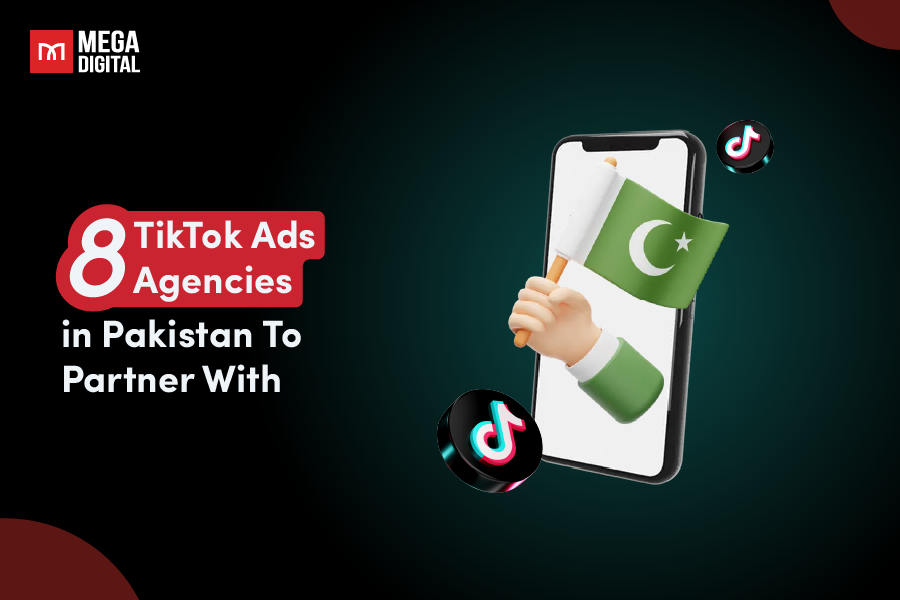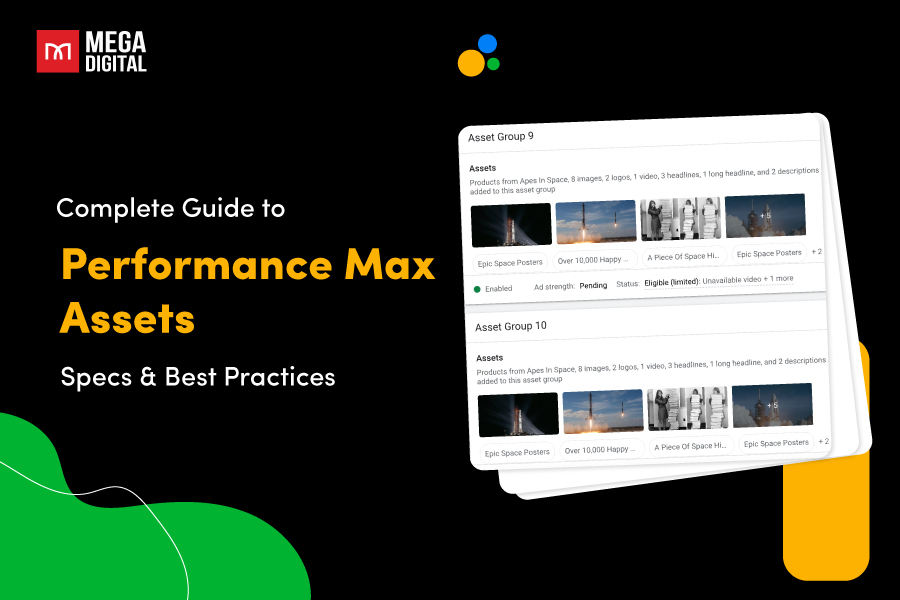Having your Facebook Ads rejected is a frustrating dilemma that many advertisers encounter. It delays your marketing campaign, and reduces reach and visibility, leading to inefficiency and wasted advertising budget. Understanding why your advertisements face rejection is crucial to rectifying the issue and ensuring your campaigns run smoothly. In this comprehensive guide, Mega Digital will point out the reasons behind Facebook Ad rejections and provide actionable insights to troubleshoot these issues effectively.
How to know if your Facebook Ads get rejected?

Upon rejection of your ad, Facebook typically sends an email notification to your registered account. This notification includes a link to Meta Business Support Home, enabling you to access detailed information regarding the cause of your Facebook Ads rejection.
Clicking on this link directs you to where you can uncover the specific reasons behind the rejection, helping you understand and address the issues effectively.
Previously approved Facebook ads might undergo additional review due to several reasons, such as:
- Unexpected high engagement: Particularly when users block or hide ads
- Missed issues during the initial review: Using user reports to pinpoint any discrepancies
You won’t receive a notification unless your ad violates Facebook’s Advertising Standards. In case of policy violations, the ad will be rejected, halting its delivery.
What are common reasons for rejected Facebook Ads?
There are several reasons why Facebook might reject an ad. Here are some common causes for Facebook ad rejection:
- Violating Facebook’s Advertising Policies
- Low-Quality or Misleading Content
- Unacceptable Targeting or Audience Selection
- Non-Compliance with Community Standards
- Issues with the landing page
- Non-compliance with Special Ad categories
Violating Facebook’s Advertising Policies
Ads that breach Facebook’s advertising policies regarding prohibited content, such as promoting illegal products or services, adult content, or discriminatory practices, are likely to receive rejection.

What to do:
Before launching your Facebook Ads campaign, it is vital to read and strictly follow Facebook’s advertising policy principles. If your product or service relates to a restricted industry, you should thoroughly review specific standards before launching ads. In doing so, you can create or recheck your Ad content to avoid infringement of the platform’s policies.
Here are some types of content that you may want to avoid in your Facebook ads:
- Unacceptable Content: Child sexual exploitation, abuse, and nudity, coordinating harm and promoting crime, dangerous organizations and individuals, discriminatory practices, hate speech, human exploitation, illegal products and services, misinformation, vaccine discouragement.
- Deceptive Content: Unacceptable business practices, cheating and deceitful practices, unrealistic outcomes, circumventing systems, prohibited financial products and services, spyware or malware, nonexistent functionality.
- Dangerous Content: Unsafe Substances, weapons, ammunition or explosives, tobacco and related products.
- Objectionable Content: Adult sexual solicitation and sexually explicit language, bullying and harassment, adult content, grammar and profanity, personal attributes, sensational content, sale of body parts,…
- Content-specific Restrictions: Alcohol, adult products or services, dating, cosmetic procedures and wellness, online pharmacies, over-the-counter drugs, prescription drugs, drug and alcohol addiction treatment, online gambling and gaming, cryptocurrency products and services, CBD and related products,…
- Intellectual Property Infringement: Third-party infringement, brand endorsement, copyrights and trademarks, brand usage in ads.
- Social issues, electoral, or political advertising
Low-Quality or Misleading Content
Facebook Ads that contain misleading information, like click-bait tactics, false sense of urgency or scarcity, or deceptive content, are prone to rejection. Low-quality images and unclear messaging can also result in disapproval.
For example, an ad promoting a weight loss supplement claims, “Lose 20 pounds in 5 days – Guaranteed!”
This advertisement could violate Facebook’s policies due to several reasons:
- Misleading Claims: The claim of losing 20 pounds in just 5 days is unrealistic and potentially misleading. Facebook prohibits ads that make unrealistic promises related to health or weight loss.
- Health and Wellness Claims: Advertising potentially harmful weight loss solutions go against Facebook’s policy on promoting health-related products or services. They aim to protect users from deceptive or dangerous claims.
- Prohibited Content: Facebook restricts ads that promote weight loss supplements with exaggerated or false claims.
- Unverified Promises: Any advertisement claiming guaranteed results without providing substantial evidence or scientific backing can violate Facebook’s policy guidelines on authenticity and accuracy in advertising.
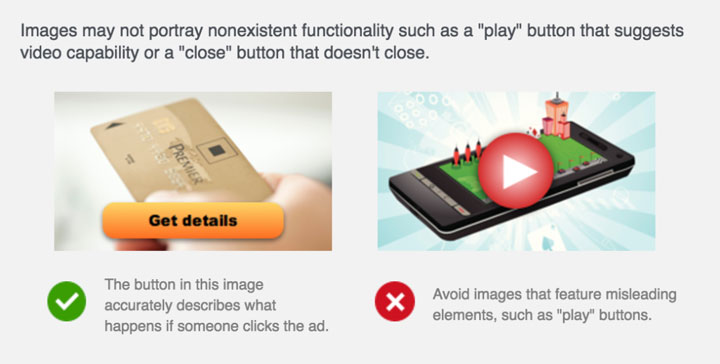
What to do:
Keeping your ad content accurate, and transparent and providing genuine value or information to users without resorting to misleading tactics or exaggerated claims are the only keys to preventing Facebook’s disapproval.
Unacceptable Targeting or Audience Selection
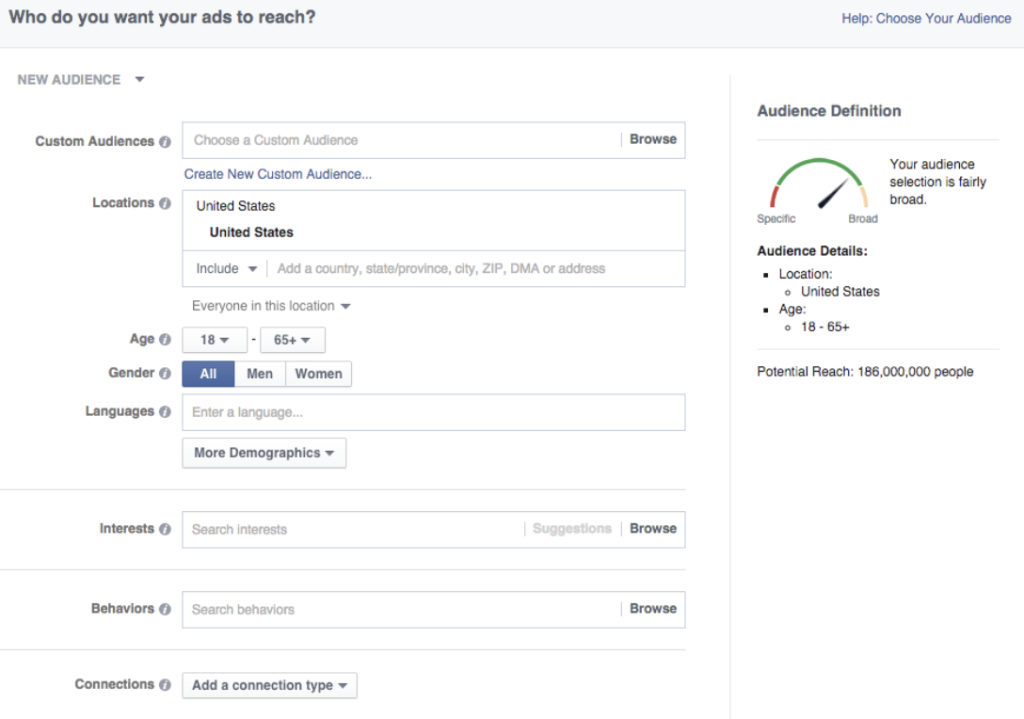
Ads targeting or excluding individuals based on sensitive characteristics are against Facebook’s policies. Here are a few categories you should pay close attention to:
- Discriminatory Demographics: Facebook does not allow targeting or excluding individuals based on sensitive characteristics like race, ethnicity, religion, gender, age, or sexual orientation.
- Exclusionary Practices: Ads that purposefully exclude certain demographics from viewing the ad based on discriminatory criteria. For example, a job ad targeting only males for a position typically open to all genders violates Facebook’s policies.
- Health-Related Targeting: Ads that target users based on health conditions, disabilities, or specific medical histories are not permitted.
- Financial Discrimination: Targeting or excluding individuals based on financial status or credit history in credit or loan advertisements is forbidden.
- Restricted Content Targeting: Certain content, like alcohol or gambling-related ads, restricts the demographics that can be targeted. Ads for alcohol cannot reach users under the legal drinking age in their respective countries.
What to do:
You, as advertisers, should ensure that your targeting criteria comply with Facebook’s policies and legal requirements and avoid discriminatory criteria in your ad content on the platform.
Non-compliance with Community Standards
Ads that don’t adhere to Facebook’s community standards are not likely to receive approval, such as promoting violence, hate speech, or content that may offend or provoke.
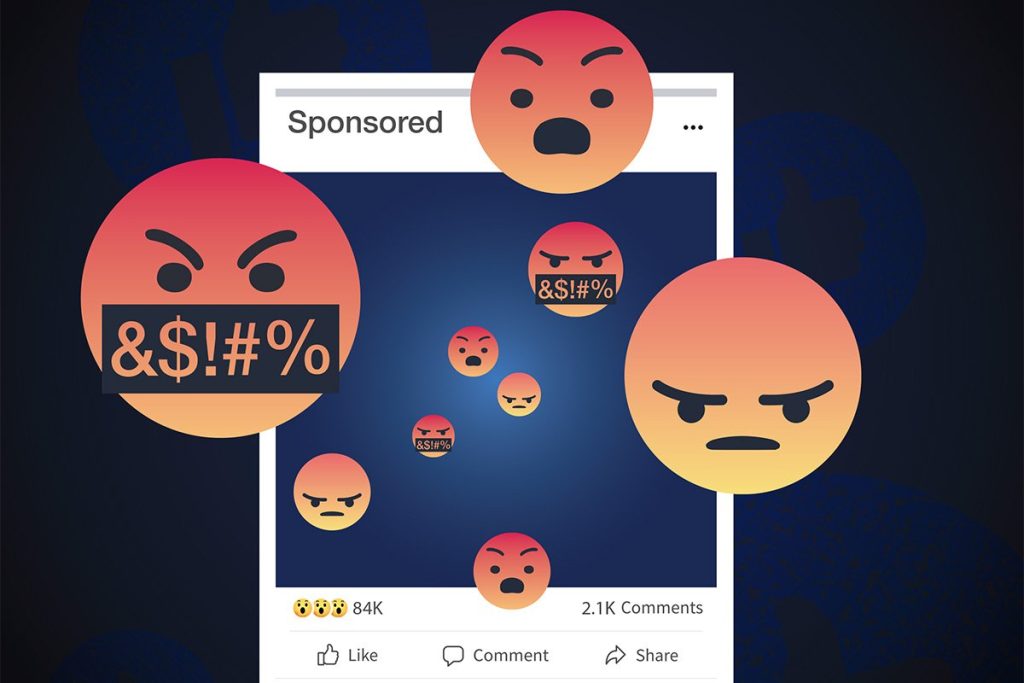
What to do
Facebook’s Community Standards are as important as its Advertising Policies. Make sure to review and understand them thoroughly before starting your ad campaign on this platform.
Here are some types of content that you may want to avoid:
- Violence and Criminal Behavior: Violence and incitement, dangerous organizations and individuals, coordinating harm and promoting crime, restricted goods and services. fraud and deception.
- Safety: Suicide and self-injury, child sexual exploitation, abuse and nudity, adult sexual exploitation, privacy violations.
- Objectionable Content: Hate speech, violent and graphic content, adult nudity and sexual activity.
>>> Read more: Comprehensive Guides to Fix Your Facebook Account Restricted
Issues with the Landing Page
If the landing page linked in the ad violates Facebook’s policies and contains malware, pop-ups, or other intrusive elements, it can cause ad rejection. Here are some common problems with landing pages to keep in mind:
- Mismatched Content: The Facebook ad promotes content, but upon clicking the link, it redirects users to a landing page that doesn’t relate to the advertised content. It might lead to a general website homepage or a different app feature not mentioned in the ad.
- Broken Links or Non-functional Pages: Clicking on the ad link takes users to a non-functional landing page or fails to load properly. This can frustrate users and diminish the user experience.
- Pop-ups or Interstitials: The landing page includes excessive pop-ups, interstitials, or intrusive elements that hinder user navigation or disrupt the user experience.
What to do:
In order to maximize the operation of landing page, here are a few things to keep in mind:
- Ensure Landing Page Relevance: The landing page should be directly related to the ad content and offer. Make sure your messaging and overall theme align with what was promised in the ad.
- Fix Broken Links or Errors: Check and rectify any broken links, 404 errors, or other technical issues on the landing page. Ensure all links from the ad lead to the intended destination.
- Minimize Pop-Ups and Intrusive Elements: Avoid excessive pop-ups, interstitials, or other intrusive elements that might disrupt user experience or obstruct access to the main content.
- Comply with Policies: Ensure the landing page content complies with Facebook’s policies and guidelines, including content authenticity, prohibited content, and transparency.
- Test and Track Performance: Conduct A/B testing on the landing page elements to identify what works best. Track user behavior using analytics tools to understand bounce rates, time on page, and conversion metrics.
Non-compliance with Special Ad Categories
Facebook’s special ad category policies aim to prevent discrimination in housing, employment, and credit opportunities. Advertisers within these categories have to follow specific guidelines to ensure fairness and equal access to opportunities while also complying with legal requirements. Failure to adhere to these policies might result in ad rejection or removal from the platform.
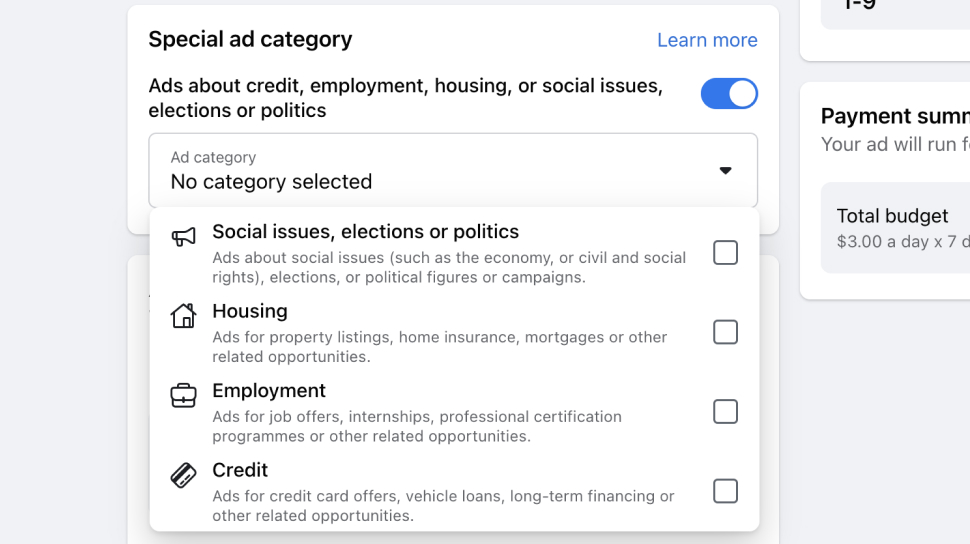
What to do:
Comprehending and adhering to Facebook’s policies and guidelines is crucial to avoid ad rejection. Regularly reviewing and aligning your ads with these policies can help mitigate the risk of rejection and ensure successful ad campaigns on the platform.
3 ways to resolve rejected Facebook Ads
If your Facebook Ads have yet to receive approval, here are some resolutions you can take to address them.
#1. Use Facebook Agency Ad Account
A Facebook Agency Ad account is a specialized type of account provided by Facebook to marketing agencies, businesses, or individuals. It can manage multiple client accounts or advertising campaigns. Moreover, Facebook Agency Ad account offers various tools and features within the platform, specifically tailored to facilitate the management, organization, and optimization of advertising efforts on behalf of clients.
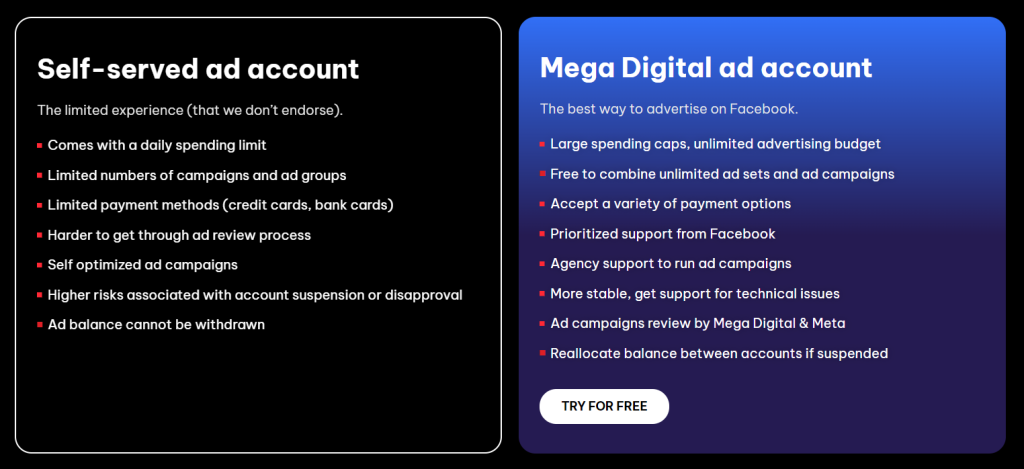
A Facebook Agency Ad account is a pre-vetted account with certain privileges and a faster ad approval process. You can start your ad campaign immediately without “warming up” your account. In addition, assistance from a team of experts can help prevent mistakes leading to ad rejection or account suspension, such as policy violations.
With the possession of a professional Facebook Agency Ad Account, Mega Digital is a great partner helping to provide insightful consultancy as well as assistance to optimize your Facebook ad campaign to yield the most success.
#2. Request Facebook to review your ad
If you doubt your Facebook Ads’ disapproval is false, you can submit a review request in Business Support Home. Here are steps to send a request review to Facebook:
- Step 1: Visit Business Support Home
- Step 2: Click to choose Ad Account with ad rejected
- Step 3: Pick an ad or a group of ads or a campaign that is assumed to be unreasonably disapproved
- Step 4: Click “Request review” button to submit
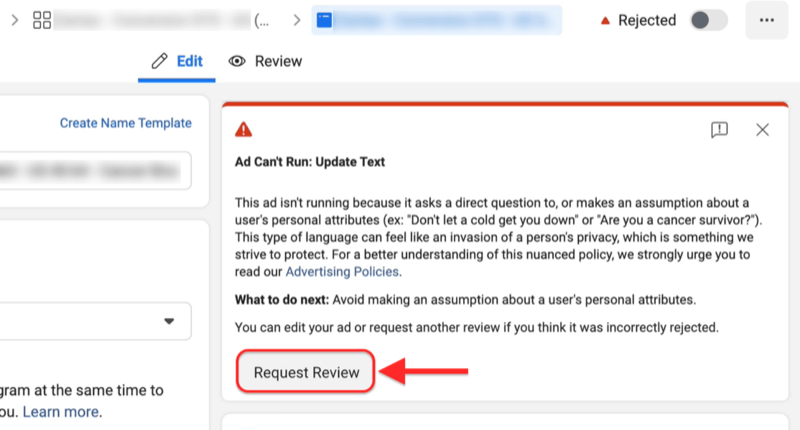
Facebook’s human reviewers will process your request, and you will receive the result within at least 48 hours. If the review result appears to be reversed, your ad campaign is automatically active. Or else it will remain rejected, and you can not re-submit a request review for the same ad. You can track your request’s status in the Business Support Home.
#3. Adjust or Create a new Facebook Ad
If your ad violates Facebook’s Advertising Policies, you can fix it by changing it. It is recommended that you examine some components that easily disobey the platform’s policies, such as images, landing pages, target audiences, and texts,… Once you edit your Facebook Ad, it will be reviewed by Facebook’s ad review system.
When do you have to create a new ad? Unfortunately, not all types of ads can be edited, and it’s simply due to your inability or your choice not to do so. In these two cases, a new ad is the better way.
Rejected ads can be deleted, but please note that you cannot request an ad review appeal if you do so. Furthermore, editing or deleting Facebook ads disapproved does not remove the mark of violation from your account.
Tips to avoid Facebook Ads Rejection
Here are top 3 tips that Mega Digital suggests to reduce the risk of your Facebook Ads being rejected:
Understand Facebook’s advertising policies
To minimize the risks of having your Facebook ads rejected, it is important to understand Facebook’s ad policies and regulations that govern content, targeting, and specific ad categories. Understand the foundational principles to ensure your ads comply and align with the platform’s policies.
Follow Prohibited Content guide
You should delve into the specifics of prohibited content categories and comprehend what’s off-limits. By uncovering the types of content that violate Facebook’s policies, you can ensure your ad creations remain within the permissible boundaries to mitigate the possibility of rejection.
Target the right audience
It is crucial to implement effective targeting strategies that resonate with your audience and adhere strictly to Facebook’s policy standards. You should understand the intricacies of acceptable targeting criteria, control the clearness of sensitive demographics, and ensure your ad targeting aligns seamlessly with platform guidelines.
Final words
Facebook Ads rejected for no reason is a painful experience for advertisers. Many have been struggling to identify the causes of the problem and solutions to it. We hope this blog will enlighten you with helpful insights and some applicable ways to resolve. To avoid unexpected mistakes, Facebook Agency Ad Account is a top-tier solution with unlimited features for your advertising campaigns. And Mega Digital is ready to help!







